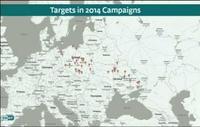-
Cyber experts divided over the scope of damage of a cyberattack on U.S.
Citing the risks of lack of preparation against future cyberattacks and the absence of security infrastructure, a new report urges across the board updates in the domain of cybersecurity. Most of the experts interviewed for the report pointed to the Stuxnet malware, which damaged Iranian nuclear-enrichment centrifuges and other nuclear-related machinery in 2010, as an example of the sort of future attacks that could disable and destroy vital infrastructure such as power grids, air-traffic controls, and banking institutions.
-
-
Scientist develops uncrackable security code for nuclear weapons
Nuclear weapons exist, so control of nuclear weapons is essential. Intrinsic Use Control (IUC) is a concept which is capable of providing improved quantifiable safety and use control within a nuclear weapon. As a basic concept, use control is best accomplished in the weapon itself rather than depending on administrative controls, fences, and guards. Using established technology, IUC uses passive use control to resist any attacks or unauthorized use of a weapon at either the component or the fully assembled levels.
-
-
Pentagon mulls “byte for a byte” cyber retaliatory operations
Much has been made of the phrase “an eye for an eye” throughout history, and it is beginning to appear that the oft-used motto will extend to the new fields of cyber warfare as well.This “approach is something our adversaries will readily understand,” one analyst writes. “If they escalate, we escalate. They know they will lose because we have far more cyber resources to draw on than they have, and we can cause real harm if they mess with us.”
-
-
NSA director: China and “one or two” other nations can damage U.S. critical infrastructure
Adm. Michael Rogers, director of the National Security Agency and head of U.S. Cyber Command, told lawmakers yesterday that China and “one or two” other countries are capable of mounting cyberattacks which would paralyze the U.S electric grid and other critical infrastructure systems across the country. A cyberattacks of such scope has been discussed in the past – it was even dubbed a “cyber Pearl Harbor” – but Rogers was the first high official to confirm that such a crippling attack on the United States was not a mere speculation. Rogers said U.S. adversaries are conducting electronic “reconnaissance” on a regular basis so that they will be well-positioned to damage and disrupt the industrial control systems which run chemical facilities, nuclear power plants, water treatment facilities, dams, and much more.
-
-
New study shows people ignore online warnings

You are your own worst enemy when it comes to online security. Say you ignored one of those “this Web site is not trusted” warnings and it led to your computer being hacked. How would you react? Would you: (A) Quickly shut down your computer? (B) Yank out the cables? (C) Scream in cyber terror? Researchers report that that for a group of college students participating in a research experiment, all of the above were true. These gut reactions (and more) happened when a trio of researchers simulated hacking into study participants’ personal laptops.
-
-
U.S. spends about $10 billion a year to protect the nation's digital infrastructure
U.S. intelligence agencies have designated cyberattacks as the most alarming threat to national security. The federal government is spending roughly $10 billion a year to protect the nation’s digital infrastructure, but hackers, some sponsored by nation-states, are successfully infiltrating civilian and military networks.Professionals from DHS, the Pentagon, and private contractors all work together in U.S. cyber centers to detect, prevent, respond, and mitigate incoming and existing cyberattacks. Several of the U.S. top cybersecurity labs are housed in nondescript office buildings with no government seals or signs.
-
-
More companies adopt active defense to thwart hackers
Some U.S. companies are beginningto counter-hack cybercriminals by using intelligence shared within industry circles. Federal officials have not openly endorsed active defense, but measures like tricking hackers into stealing fake sensitive data, then tracking its movements through the Web, are gaining support. Some firms have gone as far as hacking alleged criminals’ servers. “The government is giving ground silently and bit by bit on this [active defense] by being more open,” said former National Security Agencygeneral counsel Stewart Baker. “I have a strong sense from everything I’ve heard. . . that they’re much more willing to help companies that want to do this.”
-
-
Software detects, eradicates viruses, other malware – and repairs the damage they caused

University of Utah computer scientists have developed software that not only detects and eradicates never-before-seen viruses and other malware, but also automatically repairs damage caused by them. The software then prevents the invader from ever infecting the computer again. A3, for Advanced Adaptive Applications, is a software suite that works with a virtual machine — a virtual computer which emulates the operations of a computer without dedicated hardware. The A3 software is designed to watch over the virtual machine’s operating system and applications.
-
-
Security experts worry BlackEnergy technology could soon be available to bad non-state actors

DHS a few days ago has issued a cyberthreat alert to critical infrastructure firms warning of the malicious software called BlackEnergy, a variant of a Trojan horse believed to have originated from Russian government-sponsored hackers. BlackEnergy is similar to another Russian issued malware called Sandworm, which was used in a 2013 Russian cyber-espionage campaign against NATO, the European Union, and overseas telecommunication and energy assets. DHS believes the attack on U.S. critical systems is “part of a broader campaign by the same threat actor.”
-
-
Differences between hacking, state-sponsored cyberwarfare increasingly blurred: Experts
Cybersecurity officials say that there is an increasing similarity between hacking attacks and full-on cyber warfare, as digital infrastructures continue to grow and play a larger role in everyday life. “It’s not a clear, bright red line,” said Mitchell Silber, the executive managing director of K2 Intelligence, “It really is more murky, the difference between where a cyber criminal hack ends and where some type of state or state-sponsored event begins.”
-
-
U.S. government networks vulnerable despite billons spent on protecting them
Experts say that cybersecurity has leaped over terrorism as the top threat to U.S. security, and with the awareness of the threat comes funding better to secure government systems. There are currently 90,000 information technology security professionals working for the government, 33 percent of them are contractors. The federal government is projected to hire more cyber professionals and spend $65 billion on cybersecurity contracts between 2015 and 2020, but today, federal cybersecurity officials are still struggling to keep sensitive data from hackers and cyber criminals. Some have warned of a “Cyber Pearl Harbor” — but Pearl Harbor was a surprise. No one in business or government today can continue to plead surprise when it comes to the possibility of cyberattack.
-
-
Information sharing is key in responding to cyberattacks
Time is not your friend when your information systems are under cyberattack, but sharing threat information before, during, and after an attack with a trusted group of peers can help. Not only does it alert the other members of your community to a potential attack, it can provide critical actionable information to speed and bolster your own defenses. Participating in a formal information sharing group can greatly enhance an organization’s cybersecurity capabilities.
-
-
The best cyberdefense is cyber offense, some experts say
In response to the surge in cyberattacks against the U.S. private sector, some firms are exploring “active defense” measures which they hope will send a message to hackers.Some cyber analysts say tougher defense will not deter new cyberattacks, and some sort of offensive action is needed. “I think you are morally justified for sure” in taking such actions, a former high DHS official says. “And I think the probability of being prosecuted is very low.” If a firm locates its stolen data and is capable of recovering it, “they would be crazy not to.”
-
-
Lapses in Heartbleed bug fix discovered
First disclosed in April 2014, Heartbleed presents a serious vulnerability to the popular OpenSSL (Secure Sockets Layer) software, allowing anyone on the Internet to read the memory of systems that are compromised by the malicious bug. A detailed analysis by cybersecurity experts found that Web site administrators nationwide tasked with patching security holes exploited by the Heartbleed bug may not have done enough.
-
-
Is social media responsible for your safety during a disaster?
Given the popularity of Facebook and Twitter, it is not surprising so many people use social media in crises such as floods, fires, and earthquakes. While social media can be a handy resource in crises, people must be careful not to take their access for granted during emergencies. Floods, fires, and earthquakes often disrupt the power and communications infrastructures that smartphones rely upon, as our access is constrained by the limitations of copper, fiber, hybrid, and cellular Internet technologies, and their vulnerability to the elements. Also, some questions about the features of tools such as Facebook’s Safety Check are yet to be answered persuasively. Still, such concerns notwithstanding, it is encouraging to see an organization such as Facebook taking responsibility for its users and entering the crisis communication space. A tool that helps family and friends during a crisis, and facilitates easy communication is a welcome development.
-
More headlines
The long view
What Does Netflix’s Drama “Adolescence” Tell Us About Incels and the Manosphere?
While Netflix’s psychological crime drama ‘Adolescence’ is a work of fiction, its themes offer insight into the very real and troubling rise of the incel and manosphere culture online.
Confronting Core Problems in Cybersecurity
It’s common for governors and mayors to declare a state of emergency and activate the National Guard in the aftermath of hurricanes, tornadoes, and other natural disasters. But last month, officials in Minnesota took these steps in the wake of a major cyberattack on the city of St. Paul —a testament to how disruptive these attacks have become.
Voting from Your Sofa Is Secure Enough – but Will It Be Allowed?
A new electronic voting system developed at NTNU can withstand attacks from quantum computers, meaning digital elections can be conducted securely, even in the future.
